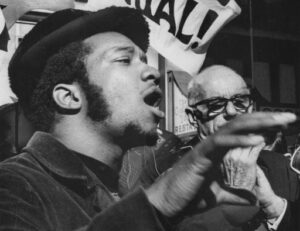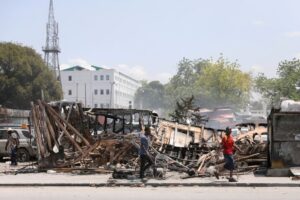On December 19, the Chilean presidential election delivered a decisive victory for the left candidate Gabriel Boric over the far-right candidate José Antonio Kast. Pablo Abufom, a member of the anti-capitalist group Solidaridad and editor of Revista Posiciones, analyzes Boric’s and what it means for the popular movement sparked from the 2019 uprising and ongoing efforts to rewrite the country’s constitution. This article, translated into English by the International Socialist Project, originally appeared in Viento Sur.
The night of November 21 was one of the most painful in recent years in Chile. The results of the first round found that José Antonio Kast, the candidate who spoke fondly of the Pinochet dictatorship and counterrevolution came in first. Kast represented the right wing that the uprising of October 2019 had challenged—forces that opposed the insubordination of the poor, feminists and indigenous people. In second place was Gabriel Boric, a student leader turned parliamentarian, representative of the Frente Amplio (Broad Front), a political alliance that had simultaneously broken with the center-left parties of the neoliberal Transition and with the marginalized radical left. This was the same Boric who had signed in a personal capacity— without the backing of his party—the Agreement for Social Peace and the New Constitution in November 2019. This action gave way to a restricted constitutional process, and for the same reason, was the focus of great criticism from the popular movement as a whole.
The most significant presidential election since 1970 seemed to lead us towards a barbarism too imaginable for anyone with a memory [of the Pinochet past]. The mobilized sectors of Chile, openly critical of Boric’s rather moderate orientation, made the quick decision to join the campaign to ensure his triumph, and above all, to deliver a crushing defeat to Kast’s Pinochetista candidacy. This became a reality December 19, with an unprecedented electoral result in many aspects. First, Boric (taking 55.9 percent of the vote) was elected with a lead of more than 11 points over Kast (44.1 percent). Second, turnout increased significantly in comparison to the first round (55.7 percent turnout, compared to 47.3 percent in the first round). It was the highest voter turnout since compulsory voting was eliminated in 2012. Finally, Boric is the president-elect with the highest number of votes in Chilean history (4,620,671). This is an unprecedented combination in a country that had a long period of high electoral abstention with the exception of the Plebiscite for the New Constitution in October 2020. Even so, in December, almost one million more people participated in the presidential election than in the vote for the constitutional referendum (7,562,173, 50.9 percent of registered voters).
In a beautiful contrast, a feeling of victory washed over the night of Sunday, December 19 in this too-long 2021 for the people of Chile. Hundreds of thousands of people took to the streets all over Chile to celebrate face-to-face what they felt was their own triumph: to have defeated Pinochetismo and to have kept open the cycle of transformation that drove the popular revolt of October 2019. But the feeling wasn’t only joy, but above all relief. The feminist movement and the LGBTQI+ community perceived very clearly the threat from the neo-fascist Kast, already foreshadowed in the governments of Trump, Bolsonaro and Orbán. Despite having few illusions in Boric, those were the sectors that most quickly stepped up to work for his victory in the second round. Some initial analyses of the vote for Boric already point to the tremendous importance of the female and youth vote in his victory.
From revolt to counter-revolt
How did we arrive at such a risky scenario? There are no simple answers, but there are some unavoidable elements. Like other countries in the region and the world, Chile is going through a long period of polarized politicization, based on social and political instability caused by multiple ecological, economic and social crises. A cycle of economic growth in the 1990s and the 2000s provided stability to the neoliberal administration of the transition to democracy. But with the price of raw materials falling around 2009, that certainty is draining away for the popular sectors who are beginning to see how their lives are becoming relentlessly precarious. Chile is a country without guaranteed and universal access to health, pensions, education and housing and where these aspects of life are privatized, either in the hands of private companies or simply on the shoulders of families. This burden falls particularly on girls, young people, and women responsible for care. Within this structure, changes in macroeconomic conditions are quickly felt in the working peoples’ daily lives.
This process of growing precarity intersects with a tremendously restricted democracy, the legacy of a constitution fraudulently approved by the dictatorship in 1980. It is a regulatory framework that concentrates political power in the Executive and Congress, with no place for communities and territories. It places extremely high bars in place to amendment, with many changes blocked by requirements for parliamentary super majorities. It is an exclusionary democracy, tailor-made for the big bourgeois parties, and replete with mechanisms that tend to exclude women, indigenous peoples and political independents.
This explosive combination led to the revolt of 2019, in which a spark of student insurgency against an increase in transit fares set fire to a prairie riddled with resentment, debt and hopelessness. The revolt was a gateway to a new era,accompanied by political violence that characterizes the awakenings of the people. But it was also a shock for the ruling class, which quickly activated its authoritarian and ideological combat mechanisms to curb this popular awakening. President Sebastián Piñera declared war on the people, bringing out the military to quell the revolt. Politically and in the media, a narrative contrasting destructive street violence with a new social pact negotiated inside Congress began to emerge. The first moment of the revolt ended in the 15N (November 15) Agreement. Thus began the institutional consolidation of the anti-neoliberal challenge, which led to the opening of a political space for the counter-revolt, now organized in the campaign of “No” to Plebiscite for a New Constitution. This introduced tension in the pro-Plebiscite camp: for or against that Agreement and its institutionalization. These are familiar scenes for popular movements around the world: long and heated debates on the risks and opportunities opened by a shift from the envisioned to the instituted.
Two years after the revolt, it is evident that the process of politicization experienced by Chilean society is not simply a one-sided shift to the left. The integration of thousands of people into political activity is occurring on the left and on the right. This does not mean that the country is simply divided in two. The popular sectors have adopted a political-social activity with feminist and leftist orientations. They participated in territorial assemblies to defend human rights or to debate the contents of a new constitution, involved themselves in campaigns to elect representatives for the Constitutional Convention, or joined social and political organizations to assume active roles in the processes of change. For its part, the right wing has organized its base in conservative and anti-communist disinformation circles, in reactionary evangelical churches, and in neo-fascist gangs that have taken to the streets in forces not seen since the 1970-1973 Popular Unity period. These shock troops attack symbols of the uprising and intimidate the popular movement. Left-wing social movement activity is massive, open, self-managed, participative and constructive, with multiple voices, while the politicization of the right is reactionary, based on small groups financed by businessmen, and with more traditional political spokesmen. One of those is José Antonio Kast, former militant and parliamentarian of the Catholic, conservative, authoritarian and nationalist right wing, who has become leader of the new Republican Party. The Republican Party pulls together the most prominent of Pinochet supporters and neo-fascism. It exists outside of the traditional right-wing coalition Chile Vamos.
Kast had already been a presidential candidate in 2017, finishing with a poor electoral showing. Since then, he has consolidated his support as the voice of reaction against the left’s aspirations to remake the constitution and the country. He has aimed his rhetorical darts mainly at the Communist Party and the Frente Amplio, but also against the feminist and LGBTQI+ movement, the Mapuche Indigenous movement and socio-environmental organizations. The revolt, and, in particular, the 2020-2021 electoral cycle, gave him the opportunity to consolidate his leadership as spokesman for “No” to the constitutional convention and as leader for a counter-revolt electoral alternative. The pandemic ratified his anti-scientific and anti-globalist position, although in a more muted way than seen in other ultra-right leaderships in the world.
These conjunctural opportunities, added to the weakness of the [traditional Right] Chile Vamos candidacies, put Kast at the head of the right-wing electoral challenge in these presidential elections. So, how did we get here? The multiple crises of capitalism in Chile have not only given rise to a transformative, anti-neoliberal, feminist and plurinational alternative, but have also provided an opening to the monsters of Pinochetismo and authoritarianism. These offer another alternative: of repression of migrants, nostalgia for the patriarchal hardline of the dictatorship and presumed economic certainty for big business.
The two poles in the transformational camp: Boric and the constituent assembly
In this redrawing of the Chilean political map, where the traditional forces of the right and center-left have shown themselves to be exhausted and out of ideas, a space for transformation has opened up. In this space, two sectors coexist: on the one hand, Boric and the coalition Apruebo Dignidad (which includes the Frente Amplio and the Communist Party), and on the other hand, the forces of social movements and native peoples that achieved an unprecedented space in the Constitutional Convention with the victories of electoral lists of Constituent Social Movements, the People’s List and constituents of Native Peoples. It is a coexistence that is not without tension, but that at least starts with the common ground of aspiration to structural change to the 1980 regime.
While Boric achieves the heterogeneous mass support I outlined at the beginning, the popular constituent sector draws its strength from the fact that the campaign for a new constitution is today at the center of the current Chilean political cycle. The recent elections are an indicator of this phenomenon. Every time the constituent process has been at stake, participation has been high and has been mostly inclined towards the transforming pole. This happened with the vote in the plebiscite, with 80 percent in favor of the “Yes” to a new constitution and in the election of convention members, where the openly anti-neoliberal forces reached the majority of the Constitutional Convention. It also happened in the second round of the presidential election, where the threat of a Kast government that would have destroyed advances in rights and blocked the revolt’s opening to a new constitution became a reality. This was not the case with the parliamentary election, where the same democratic guarantees were not given for the participation of independents, social fighters and Indigenous peoples. It is possible to state today that the popular sectors, the main guarantors of the constituent process, chose wisely in the electoral battle within the framework of a restricted democracy.
A Boric government is favorable to the constituent process, giving opportunities to popular forces that keep their independence from the government, even if they share some key goals. What’s in play for the popular forces inside and outside of the constituent assembly is taking advantage of a sympathetic government to push the constitutional convention process as far as possible to open a longer cycle of structural transformation in the economic model, the political system and the guarantees of social rights.
On the other hand, the main challenge that Boric’s government will face will be how to navigate a closely divided Congress amidst a worsening economic crisis. In this difficult, but not unprecedented, context, Boric has the opportunity to avoid being a rerun of a Concertación government [the neoliberal “center-left” governments of the 1990s and 2000s]. The success of Boric’s government clearly depends on fulfilling the promise of change to the people who celebrated in the streets on election night, and not [to surrender] to the political mandarins biding their time, waiting for the government’s mistakes,to emerge and to say that they would have done better.
In the short term, we will see reorganization in the right wing: the parties of Chile Vamos and the Republican Party will seek to build on their vote, competing for the leadership of that base for a new political cycle. Being in the minority in the Constitutional Convention, they will seek to give the maximum possible power to their bloc in Congress. And they will continue to insist on the narrative that “the moderate Boric” won the election, [repeating this] as a way of pulling the Boric government to “the center.” We will also see has-been Concertación politicians making room for themselves in Boric’s government with a mixture of false flattery and underhanded threats. They will offer themselves as a guarantee of governability, but they will continue to be the last-ditch defenders of the Transition [from the Pinochet dictatorship to limited democracy]. They will share with the right wing the task of tempting Boric towards the center, banking on his well-known tendency towards conciliation and dealsat crucial moments.
The first challenge for Boric and Apruebo Dignidad will be to determine if they will take advantage of the electoral triumph to affirm their program of structural reforms, or if the fear of rejection from the bipartisan old order will moderate them and make them distance themselves from the social base that gave them a victory they did not achieve by themselves in the first round.
New tasks for the anti-capitalist left
Against the notion that Boric’s government can only be moderate and conciliatory, the electoral results show that people are willing to defend the “constituent moment” with all their creativity and their desire to break with the current regime. The right-wing narrative of “moderation,”which liberal sectors of Apruebo Dignidad echo, seeks to transmit a message of discipline: better that the radical left and the social movements keep silent, lest they end up being responsible for a new defeat, or even worse, for a new coup d’état. We’re being asked to let Boric do whatever he needs to do, without dividing “our side” with criticism.
But the emphasis on effectively fulfilling the program is not, as some might believe, an obstacle to the realization of the transformation. On the contrary, it’s the best guarantee. These transformations will only be possible if a broad coalition of social and political movements drives them, keeping non-negotiable aspects of the program on the table, making repression unacceptable, and pushing the urgency of overcoming the moderate script of only going “as far as possible.” Faced with a government susceptible to popular pressure, it will be key to maintain the political independence of the social movements and the anti-capitalist left from the government, supporting advances and criticizing setbacks, so as not to become entangled in the ever-present (and empty) temptation of having power in the halls of government in exchange for abandoning the goal of social transformation.
What are these non-negotiable points of the program? In the immediate term, a tax reform that curtails the economic crisis in working-class households through cancellation of student debt and the institution of a universal emergency income. In the medium term, the reduction of the working day, a new pension system without AFP [i.e., privatized pension managers], a universal health fund and a national care system, in addition to modifying the conditions for collective bargaining and guaranteeing the right to strike. In the long-term, to lay the foundations for an ecological transition where the renationalization of raw materials is complemented by a reorientation of the productive matrix within a framework of solidarity and regional integration.
But along with this, the new government will have to respond to two urgent demands of sectors that are not part of its coalition, but that supported it in the second round. The freedom of Mapuche political prisoners and of those arrested in the 2019 revolt, and the right to free, legal, safe and free abortion. Both demands are part of parliamentary initiatives that the right and center-left have blocked. Boric’s government has the historic responsibility to redress the systematic violations of human rights in the present and the past, and to establish a framework for sexual freedom and reproductive justice that represents clear advances for the feminist movement and LGBTQI+ communities.
It will become necessary, then, for the diverse political and social forces inside and outside the Constitutional Convention to create an alliance that brings together the movements that have sustained the feminist, student, Indigenous and union mobilizations of recent decades with the archipelago of the radical left in mass activity. This will turn its militant potential, which has contributed so much to those same social movements, into the political capacity of the people and not just of small groups.
This popular alliance will have a difficult task: to confront the newly radicalized right wing and its desire for anti-popular revanchism. That confrontation will take place in the streets and will draw on the lessons of self-defense learned decades ago, and more recently, during the 2019 uprising. But the most lasting way to stop the ultra-right is to win over its potential popular base for a project of anti-capitalist and feminist transformation. And that is achieved by winning better conditions of life and struggle, closing off the conservative path out of the crisis. Fascism is also fought on the terrain of the daily life of Chile’s plurinational working class.
Above all, such a political and social confluence has the opportunity to become the force that will give concrete support to the drafting and approval in a 2022 plebiscite of the new Constitution. It can correct the new government’s hesitations in fulfilling its program at crucial moments. With a gridlocked Congress, popular mobilization will be key to tipping the balance at those times. The political independence and programmatic orientation of this mobilization will be the key to this new cycle.




